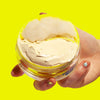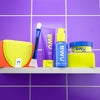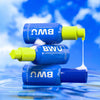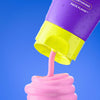David Rooney - August 2022
Fu*k clean beauty: Why we choose not to label ourselves as such
I used to only buy natural skincare.
I was afraid of ingredients with long names.
I thought that acids would melt my skin and putting "chemicals" on my face was bad.
I didn’t realise the obvious truth that EVERYTHING is a chemical—even water.
Like most people, I had a desire to be healthy and only use products that I deemed to be safe. I had a deep belief that natural meant it was intrinsically better, and anything else must be damaging or at the very least unproven.
Oh, how I was wrong.
The more I learnt about skin science; the more my views changed. I was exposed to outstanding science educators like the Australian legend Michelle Wong from Lab Muffin and Cosmetic Chemist Jen Novakovich from The Eco Well.
They challenged everything I knew, twisted it on its head, and spat it out for what it is—rubbish with a lingering stench of an overpaid marketing department.
It turns out natural is not better, and clean beauty has a lot to answer for.
When starting Boring Without You, we understood the misinformation that natural skincare and clean beauty spread throughout the world and were adamant not to be a part of it.
We realised that as a brand, we have an ethical and moral responsibility to reject clean beauty and stand up against it—a big fu*k you to the fearmongering.
So, if you're not in the mood to read a French revolution-esque post with too many exclamation marks and an overflow of passion, tap out now.
But if you genuinely want to know why we reject "clean" beauty, sip your coffee and read on.
4 reasons why we choose not to label ourselves as a "clean" beauty skincare brand
When shopping for skincare in Australia, it's hard to ignore clean beauty. Not because the products are superior, but because it's everywhere. A new clean cream. The latest facewash. An all-natural lip-balm. A toxic-free serum.
It's easy to fall victim to the marketing machine and think you need to buy clean.
1. Shady marketing tactics are not the vibe
The sad reality is fear sells better than facts. As humans, our minds are trained to remember a fear response, and this easy marketing tool sees a tangible link between demonising specific ingredients and a rise in profits.
But the reality is that pretty much all demonised ingredients are safe, yet some brands choose to reject science and their marketing teams deploy shady tactics to scare consumers into buying their product.

Why would brands choose to deceive people?
Perhaps there is a massive disconnect between marketing and research teams, and executives with no scientific knowledge hold power. Or, it's straight-up deception.
You decide.
Brands have created ubiquitous hysteria, and people are genuinely scared about what they put on their skin. They're drawn to products with excessive free from lists because they think excluding ingredients must mean it's safe.
Clean beauty brands have communicative power, and people look to them for health advice, but if anything, they are confusing people. As a consumer, I was confused. I'm sure you're confused. It's all fucking confusing.
When organisations like this are not easily understood and not transparent, you have to question who it's serving. What are the commercial and capital interests here?
2. Science is cool. We like science
You know that thing that propelled us into the 21st century. The thing responsible for everything around you. The thing that gave as medicine and the electronic device in your hand? Yeah, it's called science.
Science is cool, and when things are anti-science, it makes me question the motives. With its rejection of facts, clean beauty blatantly falls into the category.

Let's talk about the elephant in the room; parabens.
I can understand the hesitancy around parabens, when all clean beauty brands choose to exclude the ingredient from the formulas and demonise it with phrases like "no parabens" or "0% parabens".
But is this ingredient even "bad" and why do clinical brands and drug companies still choose to use this effective preservative? Let's examine with the help of renowned Cosmetic Chemist Jen Novakovich.
When justifying the exclusion of parabens, Jen says that many brands reference a 2004 study with "20 individuals, no control, and only correlative results". In simple terms, the study was speculative and has since prompted in-depth research at scale. There are now more than 1000 studies demonstrating the safety of parabens and the justification of use in cosmetics.
The cat is already out of the bag though, and what started with a few brands choosing to exclude this ingredient spawned a whole category dedicated to rejecting any subsequent studies.
But what about "toxic" ingredients?
Please remember, you can't measure the toxicity of something unless you measure the dose. Water is toxic if you consume too much.
In addition, toxicologists have analysed these paraben studies and published their conclusions. Toxicologists constantly review these studies, and new studies and safe limits for ingredients are set.
These are scientists with years and years of specialised knowledge and experience that analyse the data and make calculated decisions.
3. Clean beauty contributes to chemophobia
If you've ever heard yourself saying you only want natural ingredients or this product has too many chemicals, then you could be at risk of chemophobia.
Chemophobia means fearing chemicals and "free from" claims are one of the biggest culprits.
The rise of the natural movement and subsequently "clean beauty" led to free from claims rejecting safe and tested ingredients because they have a long, scientific product name or perpetuating fallacies as facts because it sells more product.
Consumers started not to trust science and a vicious cycle began.
Michelle Wongs says:
"Clean beauty divides ingredients into clean and dirty.
But you can't say that an ingredient is good or bad without considering how it's used. Drinking a glass of water is very different from inhaling a glass of water."

4. Natural doesn't mean better lil chicken
Words like natural and organic tell us nothing about the safety of an ingredient. Heard of poison ivy? Natural, but you wouldn't put it on your face.
I'm not saying brands can't choose to include or not include specific ingredients because there are some amazing natural ingredients, but don't train consumers not to trust science – and don't believe that all-natural is better.
The best and most effective skincare I've tried is not all-natural. You can't get a natural form of retinol, salicylic acid, benzoyl peroxide, or azelaic acid.
Have you seen what happens to vegetables when you leave them in the fridge for too long?
Clean beauty brands that applaud themselves for not using preservatives or have ineffective preservatives are potentially doing more bad than good.
Every time you open a product, it meets air, which has microbes like bacteria, yeast, and mould. These can get into the product and grow. When applied to your skin it can be dangerous.









